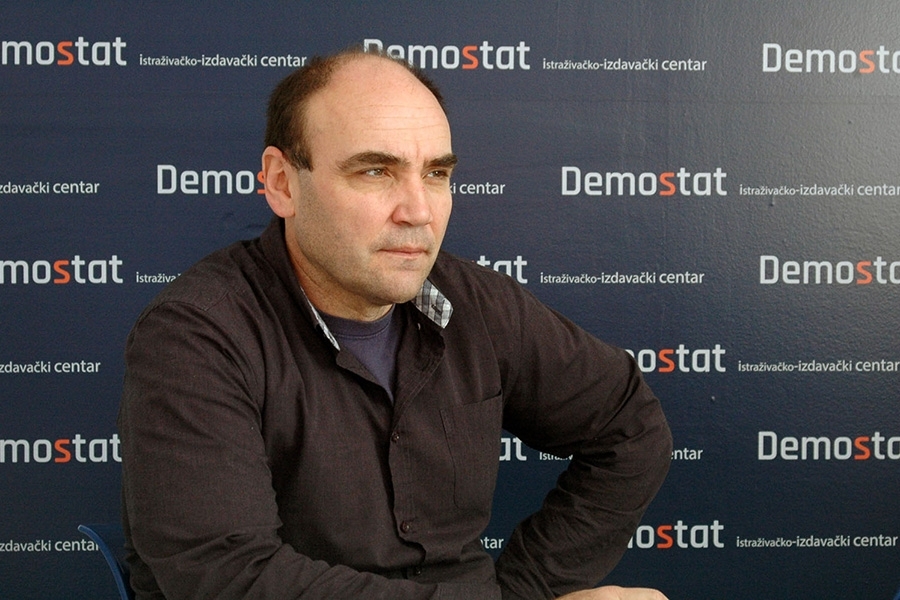Opinion polls show clearly that the opposition has a better chance in Belgrade, and the governing party at the whole of Serbia outside Belgrade, but, nevertheless, there are nuances in various urban centres.
In the so-called “right opposition” Vucic still has a control package of actions. It turned out that Vu?i? had “sleepers” in many parties.

Opinion polls show clearly that the opposition has a better chance in Belgrade, and the governing party at the whole of Serbia outside Belgrade, but, nevertheless, there are nuances in various urban centres.
In the so-called “right opposition” Vucic still has a control package of actions. It turned out that Vu?i? had “sleepers” in many parties.

It should be noted that for the opposition in Serbia, the fundamental problem is election control. All opposition parties have very weak infrastructure and the problem is that very few people in Serbia are actively engaged in politics. Everyone is politicized, talking about politics, but the party membership is few and there are not enough loyal, reliable controllers at the polling stations. And that is a big problem, because the opposition has many entities, many parties and “pseudo parties” and is too fragmented, and Vucic is a master of fragmentation, Zoran Panovic, Program Director of Demostat, told the Federal News Agency (Fena).
We are talking about the elections in Serbia, which will be on December 17th, to be held at different levels (parliamentary, provincial and local), Panovic stressed for this Sarajevo news agency that it is surprising for the voters who are against Vucic and also encouraging for them, the unification of the opposition on the list “Serbia against violence”.
Its just as bad for the right in opposition that it cant make a single list. You cant do it for both subjective and objective reasons. Therefore, often, if there is no single list of the opposition, and now it is not on the right, there are immediately doubts about who the opposition really is. And those realists who are slightly prone to paranoia are afraid of whether there are “sleepers” in the pro-European opposition, he assessed.
Responding to the question why early elections are being held in Serbia again, Panovic recalled that the previous parliamentary elections were held on April 3rd last year, together with the local, but seven days after that, opposition leader Dragan Djilas had a meeting with Vucic, who promised him early Belgrade elections by the end of 2022, since it was believed that the legitimacy of the government led by the Serbian Progressive Party would not be good in Belgrade, and Vucic is sensitive to the issue of legitimacy.
“This agreement has not been respected, and the new local elections in Belgrade will only be held now. And when it comes to parliamentary elections, after April last year, Vucic said that the new Cabinet of Ana Brnabic will be limited to two years. Thus, the Belgrade elections are a little late than planned, and the parliamentary elections will be a little earlier than anticipated, says Zoran Panovic.

As for the frequent calling of early elections in Serbia, he points out that Vucics important technology of government is early elections. With these snap elections, he constantly extends his mandates, while at the same time keeping the party in tune, as well as his cadres. And such a policy, with some propaganda, must "neuroticize" the public space in Serbia, with the fact that these elections were now very clearly requested by the opposition and Vucic fulfilled that demand.
“Not to be cynical, about these early parliamentary and local elections there is a consensus between the authorities and the opposition”, Panovic said.
Although this time the presidential elections are not in a “package” with parliamentary and local, it seems that the election campaign will again be dominated by Vucic, that everything will revolve around him. Panovic states that the presidential elections were almost over, that Vucic has legitimacy until 2017 in the end, he also complied with the "famous" Article 115 of the Constitution of Serbia, according to which the President of the Republic cannot perform any other public function. And the public office is certainly the president of the strongest party.
His predecessor, Tomislav Nikolic, did it right away, but he immediately marginalized himself. The problem here is that Article 115 is not good. It is abnormal that the strongest political figure in Serbia, and today it is Vucic, is being depoliticized. It is foolish to expect someone to have the highest political authority, to win the election, and to simply retire and reduce to a protocol role. Thats why the Constitution is so bad, Panovic said.
On the other hand, he adds, Vucic is the strongest political figure in Serbia and it is pointless not to lead the list of his party. All the other “Progressives” have an incomparably worse rating and there is absolute dominance of Vu?i?. This party has a clear principle of subordination, it is hierarchical and leadership and there are no dilemmas. Milos Vucevic, who is the President of the Serbian Progressive Party, says Panovic, there is more “one transmission” of Aleksandar Vucic.
Panovic states that public opinion polls show clearly that the opposition has a better chance in Belgrade, and the governing party at the whole of Serbia outside Belgrade. However, there are still some nuances in various urban centers.
Zoran Panovic believes that in the so-called “right opposition” Vucic still has a control package of shares.
-It turned out that Vu?i? has “sleepers” in many parties. At the same time, there is the issue of “moral toughness” that many politicians and “pseudo-politicians” in Serbia are not such as to be able to resist"indecent offers" from the authorities, Panovic warns.
According to Panovic, the parties of the ruling bloc are well-organized, very strong, and coming to power is always attractive. “Also, Vucic managed to do one thing - that Serbian Progressive Party from 2011 and 2012, which emancipated itself from the Serbian Radical Party led by Vojislav Šešelj and which provided support to Boris Tadi? for a stabilisation and association agreement with the EU, no longer exists”.
In all societies there are issues that are rather being skipped. Certain...
The neoliberal path, started in 2001, has led to especially bad results in Serbi...
For centuries, the region was subsumed within the Ottoman and Hungarian Empires,...
"Serbia has returned to the systemic and anti-systemic position of the political...
In reality, Serbia is closer than ever to NATO. In the course of the last five y...